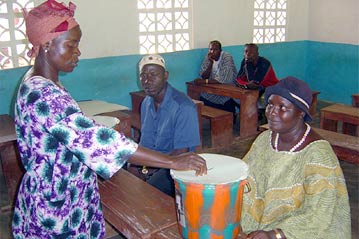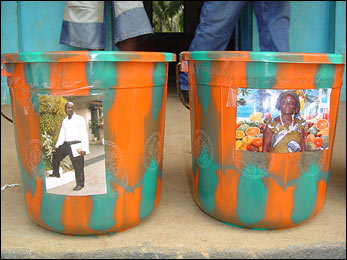The other election: Liberian refugees find voice in Sierra Leone
The other election: Liberian refugees find voice in Sierra Leone

KISSY TOWN, Sierra Leone, Nov 1 (UNHCR) - As the United States waits with bated breath for the outcome of the November 2 election of the US President, halfway across the world, another group has held its own, equally important peaceful election.
On Saturday, 450 Liberian refugees voted for a Chairperson for their small community in Kissy Town on the outskirts of Freetown, Sierra Leone. Some among this refugee group have been in exile in Sierra Leone since 1990 and are considered by UNHCR to be the "old Liberian caseload". This terminology differentiates them from those Liberians who sought exile in Sierra Leone starting in 2001 and are housed mostly in camps in the interior.
Most of the refugees in Kissy Town fled the fighting in Liberia that had started in 1990 under the leadership of former President Charles Taylor. Unlike many Liberian refugees who started returning home with UNHCR in October, repatriation is not an option for this group. Most await the results of their resettlement petitions to countries like the US and Canada. Others realise that the settlement they are living in is now home.
As the years passed, the refugees integrated locally with the existing Sierra Leonean community. However, in all these years, their leadership has been ad hoc, with no formal elections ever having taken place.
In an attempt to standardise refugee elections in Sierra Leone, an electoral commission was established and comprised refugee representatives, NaCSA (the National Association for Social Action, UNHCR's main governmental counterpart), a community development committee with both refugee and host community members, Lutheran World Service and UNHCR. The commission declared that all candidates for Chairperson must be over the age of 25, literate, free of any criminal activity, and must be a legal resident of the Kissy Town settlement.
Campaigning was done throughout Friday night, with the candidates banging drums and using bullhorns to share their platform with the community. The two candidates for Chairperson were Susan Koroma and Joseph Masalay. On Saturday, democracy ruled as one by one, refugees lined up to cast their first ever ballot for the person they believe should represent them to the host community, the government of Sierra Leone, UNHCR and its partners.
To make sure that everyone, including the illiterate, voted for the person of their choice, pictures of the candidates were pasted on each ballot bucket. Voters simply had to drop their ballot in the bucket of the candidate they wanted to win.

In the end, Koroma, better known as "Aunty Sue", prevailed and was declared the winner of the election. She exclaimed, "I am ready to work for my Liberian people, I am so happy."
Saturday's election may not influence the world order, but for this small community, holding fair and democratic elections for their Chairperson means the world.
By Rachel Goldstein-Rodriguez
UNHCR Sierra Leone








